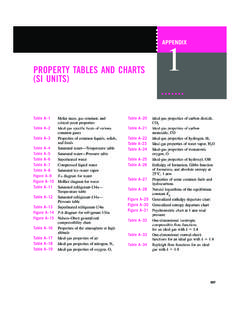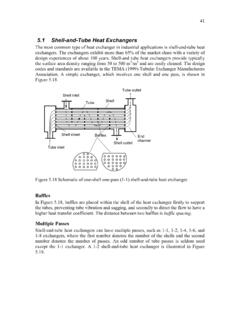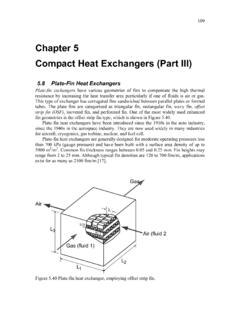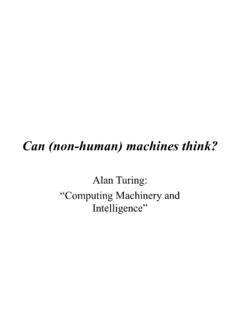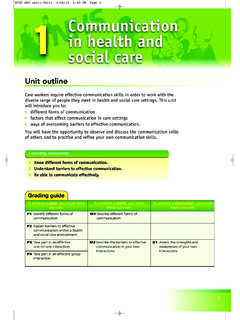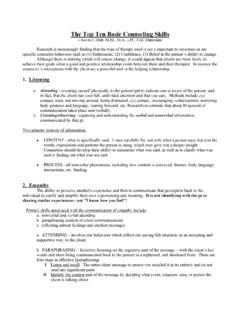Transcription of Understanding and Working with Students and Adults from ...
1 Understanding and Working with Students and Adults from Poverty The hidden rules of the middle class govern schools and work; Students from generational poverty come with a completely different set of hidden rules. by Ruby Payne, Baytown, Texas ---------------------------------------- -------------------------------- "I had to hit him, Miss! He was messin' with me!". "What did he say?". "Nothin'! He was lookin' at me, Miss!". If this incident is familiar to you, then you have encountered the hidden rules of generational poverty.
2 Quite simply, one rule is that non-verbal communication is much more important than verbal communication. A second rule is that physical fighting is often necessary for survival. To understand and work with Students and Adults from generational poverty, a framework is needed. This analytical framework is shaped around these basic ideas: o Each individual has resources that greatly influence achievement; money is only one. o Poverty is the extent to which an individual is without these resources. o The hidden rules of the middle class govern schools and work; Students from generational poverty come with a completely different set of hidden rules and do not know the hidden rules of the middle class.
3 O Language issues cause many Students from generational poverty not to fully develop the cognitive structures needed to learn at the levels required by state tests. o Teaching is what happens outside the head; learning is what happens inside the head. For these Students to learn, direct teaching must occur to build these cognitive structures. o Relationships are the key motivators for learning for Students from generational poverty. Key Points Some key points about poverty need to be addressed prior to discussing the ways to work with those affected by it.
4 1. Poverty is relative. If everyone around you has similar circumstances, the notion of poverty and wealth is vague. Poverty or wealth only exists in relationship to known quantities or expectation 2. Poverty occurs in all races and in all countries. The notion of a middle class as a large segment of society is a phenomenon of this century. The percentage of the population that is poor is subject to definition and circumstance. In the 1990 census data, million of America's children (individuals under the age of 18) lived in poverty.
5 Of that number, the largest group was white. However, by percentage of ethnic groups, the highest percentages are minority. 3. Economic class is a continuous line, not a clear-cut distinction. In 1994, the poverty line was considered $14,340 for a family of four. In 1994, seven percent of the population made more than $100,000 per year as indicated on tax returns. Individuals move and are stationed all along the continuum of income. 4. Generational poverty and situational poverty are different. Generational poverty is defined as being in poverty for two generations or longer.
6 Situational poverty involves a shorter time and is caused by circumstance, death, illness, divorce. 5. Thses points are based on patterns. All patterns have exceptions. 6. An individual brings with him or her the hidden rules of the class in which he or she was raised. Even though the income of the individual may rise significantly, many of the patterns of thought, social interaction, cognitive strategies, remain with the individual. 7. Schools and businesses operate from middle-class norms and use the hidden rules of the middle class.
7 These norms and hidden rules are never directly taught in schools or in businesses. 8. For our Students to be successful, we must understand their hidden rules and teach them the rules that will make them successful at school and at work. We can neither excuse them nor scold them for not knowing; as educators, we must teach them and provide support, assistance, and high expectations. 9. To move from poverty to middle class or middle class to wealth, an individual must give up relationships for achievement.
8 Resources To better understand Students and Adults from poverty, the definition of poverty will be the "extent to which an individual does without resources" including: o Financial--Having the money to purchase goods and services. o Emotional--Being able to choose and control emotional responses, particularly to negative situations, without engaging in self-destructive behavior. This is an internal resource and shows itself through stamina, perseverance and choices. o Mental--Having the mental abilities and acquired skills (reading, writing, computing) to deal with daily life.
9 O Physical--Having physical health and mobility. o Support Systems--Having friends, family, backup resources and knowledge bases available to access in times of need. These are external resources. o Role Models--Having frequent access to appropriate Adults who are nurturing to the child and who do not engage in self-destructive behavior. o Knowledge of Hidden Rules--Knowing the unspoken cues and habits of a group. In Working with Students and parents, it is important to analyze the resources that are available.
10 For example, if a parent is illiterate, then tasks that can be requested of that parent are much different from those requested of a parent who is highly educated. Likewise, a student may have financial wealth but not have many of the other resources, particularly a nurturing role model. This lack may greatly affect his achievement. Language and Story Structure To further understand why achievement and discipline are such issues for Students from generational poverty, awareness of the registers of language is particularly helpful (Jobs, 1967).


